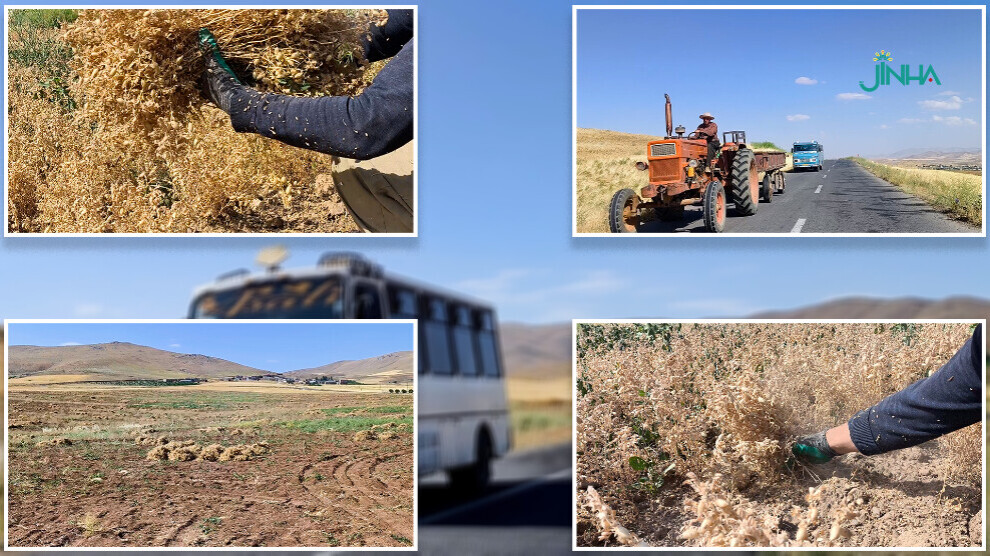Chickpea harvest starts in Rojhilat: Women face poor working conditions
Due to the lack of job opportunities in Sardasht, women have to travel 200 kilometers by using old minibuses to harvest chickpeas in the cities of Mahabad and Bukan despite poor working conditions.

NESIM MUHAMMED KHAH
Bukan- Seasonal workers have already started harvesting chickpeas in the city of Sardasht, located in the south of Urmia province on the border between East and South Kurdistan. Due to the lack of job opportunities in the city, most women work as seasonal workers and they have to travel 200 kilometers every day by using old minibuses to harvest chickpeas in the cities of Mahabad and Bukan.
Suffering from poor working conditions, female seasonal workers are also paid low wages. They have to wake up at 3 a.m. to travel to Mahabad and Bukan.
They work without social security
One of the most important problems faced by seasonal workers, who work between 5 a.m. and 4 p.m. every day, is that they work without social security and their rights; they cannot enjoy their rights because they are unregistered workers. Female seasonal workers also suffer from gender pay gaps; they are also paid less than men even though they do the same work, sometimes more than men. In Addition, seasonal workers have to bring their food and work gloves with themselves.
‘We spend three hours every day to reach Bukan’
Sardasht has no job opportunities because there is no investment in agriculture and industry. Due to the lack of job opportunities, women living in the city have to travel to other cities. In the city, hundreds of women travel to the city of Bukan during the chickpea harvest season. NuJINHA spoke to some of these women.
Hero S. (17) is a seasonal worker living in one of the towns of Sardasht. “This year, my mother and I decided to harvest chickpeas in order to earn a living. My father used to work as a kolber (Kolbers are the cross border traders). However, he was injured and cannot work anymore. Every day, we wake up at 3 a.m. and then get on minibuses with other workers. We spend three hours every day reaching Mahabad and Bukan. We bring our breakfast and lunch with us because the employers only give us ice and cold water. We have about an hour to have lunch and half an hour to have breakfast. At 4 p.m., we get on the minibuses to return. After going back home, we have dinner and go to sleep at 8 p.m.”
They are paid low wages
“Especially women and girls face poor working conditions,” said Shida N., an activist in Sardasht. “They have to work hard and travel by using minibuses for more than 4-5 hours a day. They are paid about 600,000 tomans and this amount is very low. Seasonal workers have to bring their food and work gloves with them.”
Noting that seasonal workers need support, Shida N. said, “Social welfare organizations should support them to have better working conditions. In addition, investments in Sardasht will create more job opportunities for women and women will not have to travel to other cities to work.”
